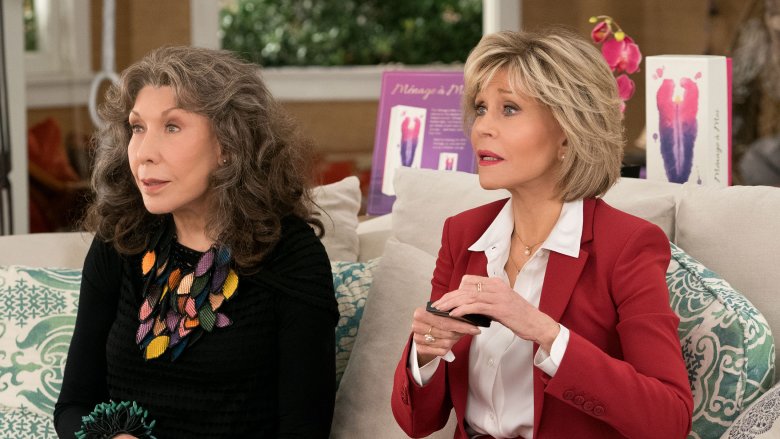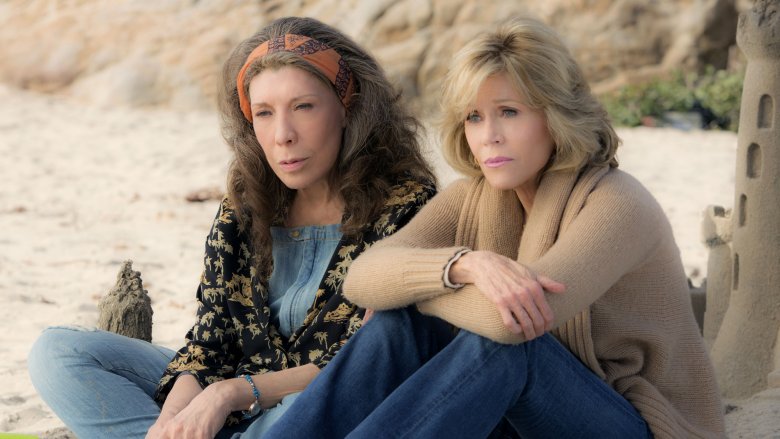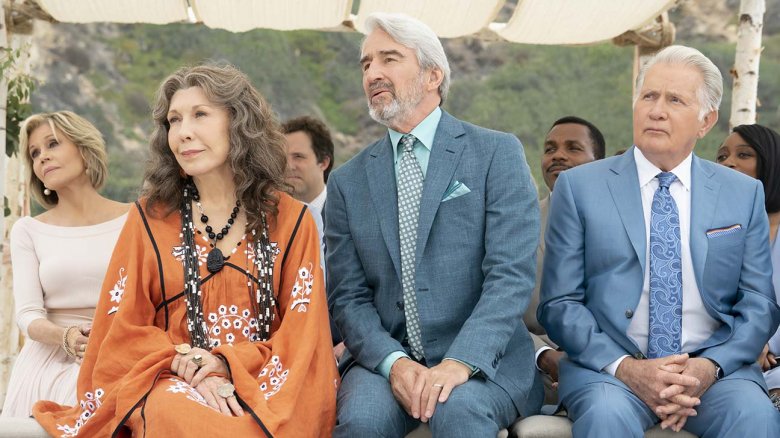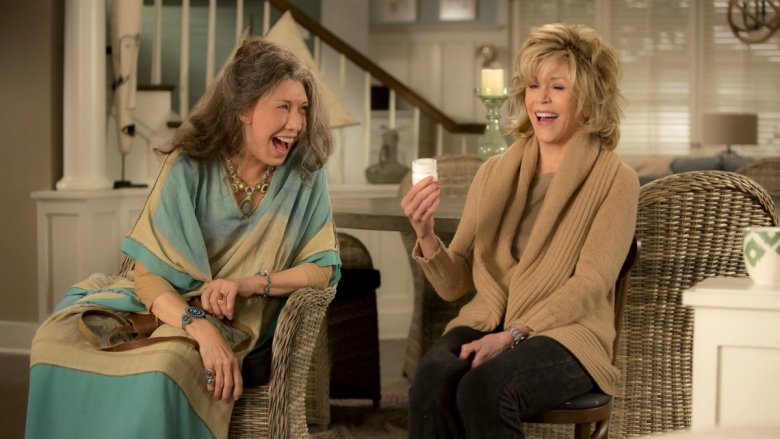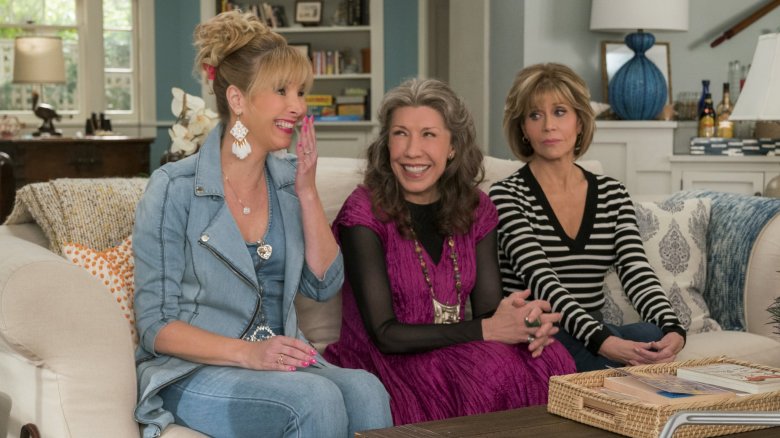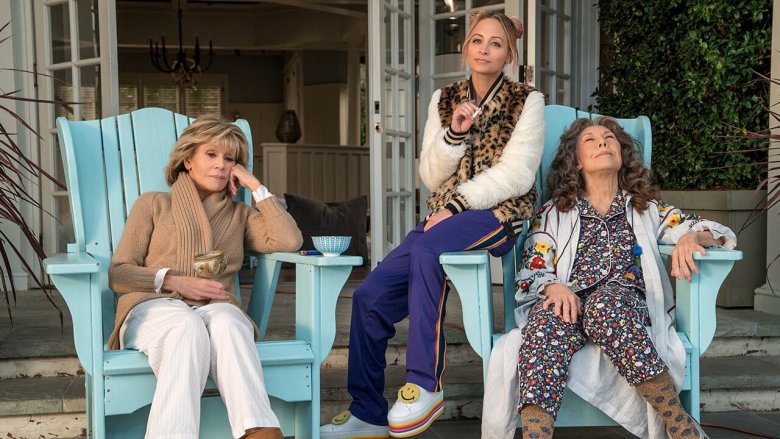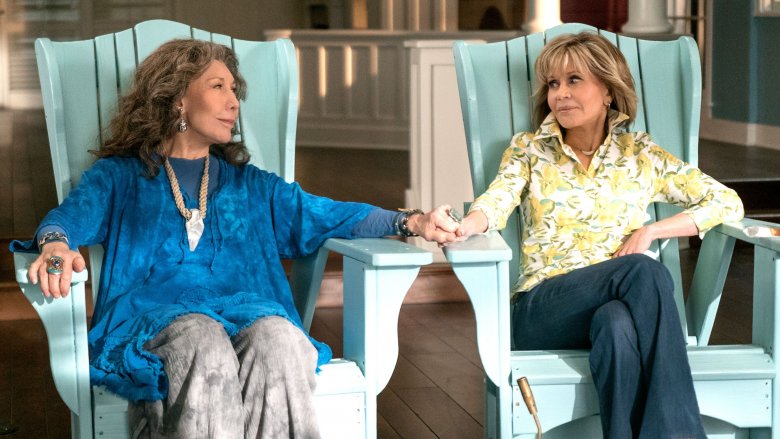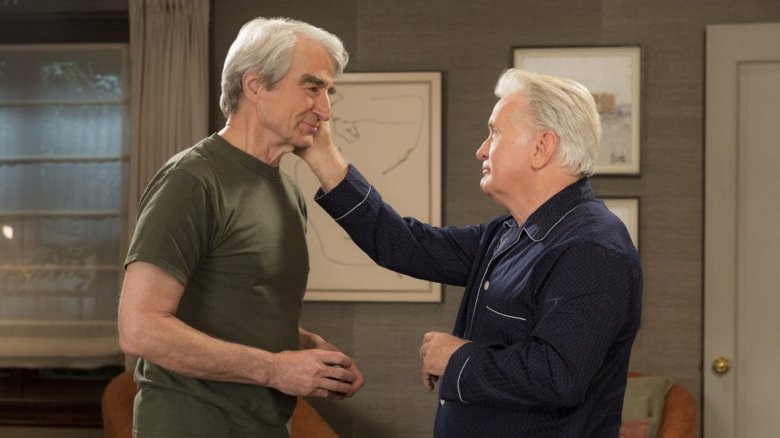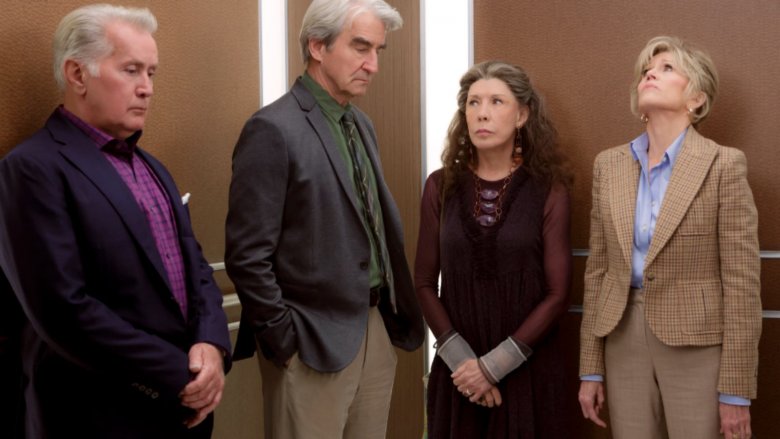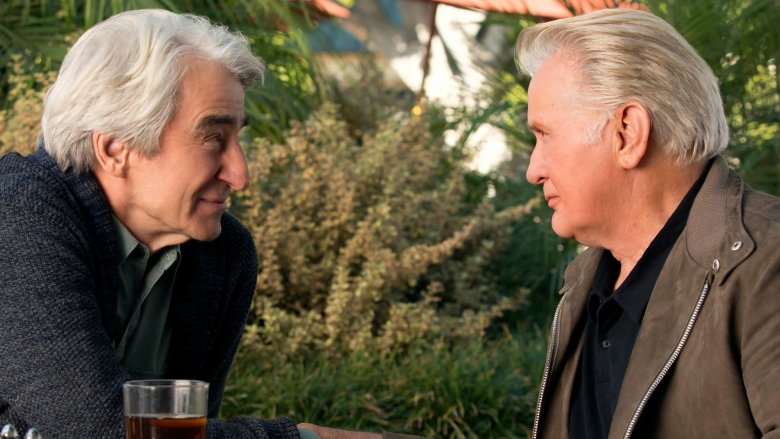Grace And Frankie: The Real Reason Netflix Canceled The Popular Show
Grace and Frankie had to have its last season sometime. After all, all good shows must come to an end, whether it's Orange is the New Black, The OA, or Sense8, to name just a few. And while some of our favorites get a longer run than others, going on indefinitely just isn't a realistic option, even in the streaming age. So it's time to say goodbye to the Netflix dramedy Grace and Frankie, which has kept fans laughing and crying since 2015.
With a star-studded cast featuring Lily Tomlin, Jane Fonda, Sam Waterston, and Martin Sheen, Grace and Frankie sought to answer a big question: what happens when two married men, who have been having an affair for two decades, finally decide to come out, divorce their wives, and marry each other? Specifically, how will their spouses, who are long-time frenemies, cope with having their lives turned upside-down by their husbands' revelations? Fortunately for fans, there will be plenty of time to wrap everything up, as Grace and Frankie has been given the green light for seven seasons. But after that, the show will wrap for good.
So just why did Netflix cancel Grace and Frankie? Read on to find out.
Grace and Frankie already outlasted everyone else
It's an all too familiar scenario: you start watching a show on Netflix, and immediately you're hooked on it. You binge-watch through the first season in a weekend, then have to wait months or years for a new one. And when you finally get to dive into that second or third season, you find that it's even better than the first. But then you get the news that your favorite show has been cancelled, leaving you with loose ends that will never be tied up.
As frustrating as that is, get used to it, as Netflix is pulling the plug on more and more shows after just two or three seasons, according to an article in Deadline. To that end, it's pretty incredible that Grace and Frankie lasted as long as it did. In fact, after it concludes, it will surpass Orange Is the New Black as the longest-running Netflix series ever.
So while you may be bummed that Grace and Frankie isn't an immortal series, be grateful that we've enjoyed it for this long.
Did the stars of Grace and Frankie demand more pay?
In 2015, there was a bit of a controversy related to Grace and Frankie. At a press conference, star Jane Fonda dropped a bomb about her and Lily Tomlin's salaries. "[Tomlin] found out [Sam Waterston and Martin Sheen] are getting the same salary that we are," Fonda said, according to an article in Vanity Fair Hollywood. "That doesn't make us happy."
Fans, who were outraged by this information, took to the Internet to start a petition. In it, they demanded that Netflix executives increase compensation for Tomlin and Fonda, as they're the stars of the show, and their male counterparts are supporting cast members. All in all, the petition amassed nearly 9,000 signatures.
In an interesting twist, however, a publicist later reached out to Vanity Fair Hollywood to clarify things. "We made a joke in an interview about our salaries which was taken out of context," Tomlin and Fonda said in a joint statement, adding, "We appreciate everyone's support and the attention to this issue but the structure of Grace and Frankie is fair." Hmm...
The humor on Grace and Frankie sometimes fell flat
Grace and Frankie has been lauded by critics as a very funny show that's ushered in a new age of comedy, picking up where the beloved series The Golden Girls left off. And given that it stands to become the longest-running series in Netflix history, it's clear that plenty of people are watching the show and are laughing along with its many jokes.
But not everyone is thrilled with the brand of humor in Grace and Frankie, according to an article in Mic. Specifically, some of the jokes on the show sound like gags someone would make in the 1990s, which render them super dated. Additionally, the jokes that the women make about their ex-husbands' sex lives are often reductive, causing them to fall flat.
Perhaps if the jokes on the show were sharper and more sophisticated, Netflix might have considered giving Grace and Frankie an eighth season.
Grace and Frankie's characters are under-developed
Although the friendship between Lily Tomlin and Jane Fonda's characters in Grace and Frankie grows and develops throughout the series, some have argued that there could have been better character development, which would have truly showcased the skills of both actors.
For example, according to an article in Salon, Tomlin is your typical Southern California hippie with an interest in drugs and shamanism, and Fonda is a status-conscious woman who mourns the loss of her youthful good looks — essentially rendering them as caricatures instead of fully-developed individuals. Plus their dislike of one another doesn't seem to be rooted in anything other than they're very different from one another, which isn't a very good reason for mutual acrimony.
Given how incredibly talented both Tomlin and Fonda are, it's a shame that the writers couldn't find a way to flesh out deeper personalities for their characters in Grace and Frankie. That's a missed opportunity that could have cost the show a longer run.
Does Grace and Frankie rip off Transparent too much?
Although Grace and Frankie centers on two older women and their friendship, some critics have pointed out that the show borrows a little too much from the Amazon series Transparent, according to an article in Salon.
For one, Grace and Frankie was announced by Netflix just one month after Transparent started streaming on Amazon. Additionally, there's a major plot parallel, as Transparent is about a septuagenarian transgender woman who comes out of the closet, and Grace and Frankie is about two women in their 70s navigating the fallout after their husbands come out as gay. Furthermore, like Transparent, Grace and Frankie is set in suburban Los Angeles, so the scenery and vibe of the region are equally present in both series.
To top it all off, the adult children in Grace and Frankie have complicated relationships with one another, in yet another direct plot parallel to Transparent. Add all of these points up, and you might have one more reason Grace and Frankie isn't getting an eighth season, as it comes off a little too much like Transparent.
Grace and Frankie wasn't very realistic
What happened to the women of Grace and Frankie could happen to anyone, as marriages dissolve all the time, even between people who have been together for many years, according to an article in Psychology Today. Additionally, Grace and Frankie addresses other critical issues, such as Grace struggling with her cold extended family and one of Frankie's children being in recovery for substance abuse.
But despite tackling these real-world issues, Grace and Frankie just doesn't feel very realistic, as noted in an article in Vulture. For one, Coyote's sobriety isn't given the serious acknowledgement in the show that it should, as it's treated quite superficially. Additionally, when Grace's family disregards her, it's made out to not be a big deal, when in reality it would be extremely difficult to deal with. And when it comes to the character meltdowns, they often can seem contrived and campy.
Perhaps if Grace and Frankie was filmed with a live studio audience, as sitcoms used to be, it would have been more successful. But ultimately, it might not have been real enough for people, ultimately leading to Netflix deciding to cancel it.
The chemistry between Grace and Frankie's Sol and Robert could have been better
Grace and Frankie leaves something to be desired when it comes to the show's queerness, and it's not just because the premise of Grace and Frankie's husbands being together was an afterthought when creating the show. Rather, the chemistry between Sam Waterston and Martin Sheen falls flat on more than one occasion, according to an article in Mic.
Mainly, the relationship between the two men reads more like they're two good friends, instead of two lovers who can finally be together after 20 years of secrecy. And yes, you can attribute some of that to them being older men who've been together for a long time. But given how passionate these actors have been in shows like Law & Order and The West Wing, you know they have to chops needed to convey a passionate relationship. It wouldn't need to be graphic, either — just more believable in their tender moments.
Perhaps that was just one more nail in the coffin for Grace and Frankie.
Grace and Frankie's queer plot is secondary
Given that the premise of Grace and Frankie hinges on the woman's husbands falling in love with each other and finally coming out so they can be together after 20 years of hiding their relationship, there's no doubt that it's a queer show. Or rather, it's trying to be a queer show.
However, some critics have argued that the queerness in Grace and Frankie seems secondary instead of out in front like it should be, according to an article in Salon. Well, there's a reason that might be the case, as the queer premise was added after the two leads had been cast, showing that the priority was to have a show with Jane Fonda and Lily Tomlin, and not necessarily a queer one. "Once we knew that Jane and Lily were both interested, we had to come up with an idea that would be worthy of them because they're both so extraordinary," creator Marta Kauffman revealed. Then, when her development executive suggested that the characters' husbands fall in love, Kauffman jumped on it.
Maybe if the Friends co-creator hadn't put the cart before the horse, Grace and Frankie wouldn't be ending so soon.
Grace and Frankie pits gay men against aging women
On the surface, the premise of Grace and Frankie sounds like a rich scenario to explore, something that's only possible now that we've ushered in a more tolerant era. Considering that the series launched just as same-sex marriage became the law of the land in the United States in 2015, the situation explored on the show is, on its face, extremely compelling.
Unfortunately, in its execution, Grace and Frankie managed to take two marginalized groups — aging women and gay men — and make viewers only sympathetic to one of them: the women. Sol and Robert have been lying to their wives for 20 years, something that's tough to swallow despite the cultural climate that prevented them from being together. And given that the show skews heavily towards the women's perspective, according to an article in Salon, viewers are naturally more inclined to be sympathetic to their perspective. It's only later on in the series that the men show any remorse for their actions, giving viewers a long-awaited chance to understand their plight.
Perhaps if the writers had addressed that sooner, Netflix wouldn't have canceled Grace and Frankie.
